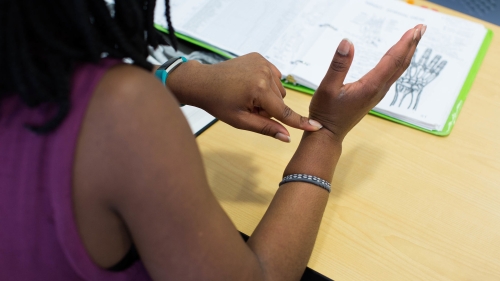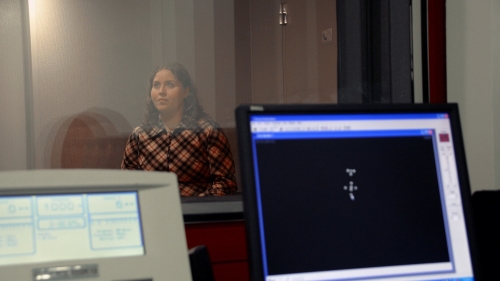

Gerald Voelbel, PhD is an Associate Professor of Cognitive Neuroscience in the Department of Occupational Therapy. His main research interests focus on the development of neuroplasticity-based cognitive remediation techniques to improve cognitive deficits, such as processing speed, executive function, and working memory in individuals with traumatic brain injuries. Dr. Voelbel investigates the remediation of the cognitive deficits as they relate to performing everyday tasks and psychological problems. An additional area of interest for Dr. Voelbel is the use of functional and structural imaging methods to identify biomarkers of cognitive deficits in concussions and in more severe traumatic brain injuries.
Current Studies
Shining Light on Trauma: Treatment of Chronic TBI to Improve Psychological Health Using Photobiomodulation in Service Members, Veterans, and First Responders
This project is a collaboration with Western Institute for Veterans Research in Utah that investigates a combined method to improve chronic and long-term cognitive and psychological sequelae of mild traumatic brain injury using transcranial photobiomodulation and computerized cognitive rehabilitation in Service Members, Veterans and first responders.
Verbal Working Memory and Attention Remediation for Adults with Traumatic Brain Injury
The purpose of this study is to examine if cognition in individuals with moderate to severe traumatic brain injury can be improved. This project examines if computerized cognitive remediation improves working memory and attention in adults with moderate to severe brain injury. Clinical Study Identifier: s20-00130
If you had a brain injury, between the ages of 18 and 65, no current substance use, do not have a diagnosis of Bipolar Disorder or Schizophrenia contact me at GV23@nyu.edu or
Validity of Online Cognitive Assessment
The purpose of the study is to compare the administration of in-person traditional clinical neuropsychological tests to the online administration of the same neuropsychological tests through a videoconferencing.
Eligibility Criteria:
Above the age of 18 years old
Physically able to operate a computer and assessment measures
Free of current drug or alcohol use disorder diagnosis
No history of schizophrenia or bipolar disorder diagnosis
Free of mild cognitive disorder or dementia diagnosis
Processing Speed and Working Memory on Cognitive Abilities
The purpose of the study is to investigates the effects of processing speed on working memory and cognitive flexibility in healthy adults.
Eligibility Criteria:
Above the age of 18 years old
Free of current drug or alcohol use disorder
No history of schizophrenia or bipolar disorder diagnosis
No history of a neurological condition
Selected Publications
Lindsey, H.M., Rath, J.F., Bushnik, T., Flanagan, S., Lazar, M., & Voelbel, G.T. (2026). Computerized Cognitive Remediation Affects White Matter Microstructure in Relation to Improved Cognitive Function in Adults with Chronic Traumatic Brain Injury. Journal Neurotrauma. https://doi: 10.1177/08977151251414085
- Jauregui, R., Evens, A.M., Zekeridou, A., Steriade, C., Hudson, T., Voelbel, G.T., Rucker, J.C. (2025). Anti-RGS8 Paraneoplastic Syndrome Presenting with Skew Deviation and Mild Cerebellar Dysfunction. The Cerebellum, 24, 76, https://doi.org/10.1007/s12311-025-01827-w
- Anna Palumbo, A., Groves, K., Luna Munoz‑Vidal, E., Turry, A., Codio, R., Raghavan, P., Schambra, H., Voelbel, G.T., & Ripollés, P. (2024). Improvisation and live accompaniment increase motor response and reward during a music playing task. Scientific Reports, 14, 13112. https://doi-org.proxy.library.nyu.edu/10.1038/s41598-024-62794-6
- Estelle, M.C.P. & Voelbel, G.T. (2024). The Effect of Processing Speed on Verbal and Visual Memory of Adults with a Chronic Acquired Brain Injury. Brain Injury, 38(3), 170-176.doi.org/10.1080/02699052.2024.2309250
- Genova, H. M., Chen, M. H., Botticello, A., Voelbel, G., Kim, G., Elsayed, H. E., Myszko, Z., DeLuca, J., McGrath, R. E., Arnett, P., & Goverover, Y. (2023). An examination of positive and negative outcomes during the COVID-19 pandemic among persons with multiple sclerosis. American Journal of Occupational Therapy, 77, https://doi.org/10.5014/ajot.2023.050287
Lindsey, H.M., Lazar, M., Mercuri, G., Rath, J.F., Bushnik, T., Flanagan, S., and Voelbel, G.T. (2022). The effects of plasticity-based cognitive rehabilitation on resting-state functional connectivity in chronic traumatic brain injury: A pilot study. NeuroRehabilitation, 51(1):133-150 doi: 10.3233/NRE-210264.
- Kim, G.J., Kim, H., Fletcher, J. Voelbel, G.T., Goverover, Y., Chen, P., O'Dell, M.W., & Genova, H.M. (2022). The differential impact of the COVID-19 pandemic on healthcare utilization disruption for community-dwelling individuals with and without acquired brain injury. Archives of Rehabilitation Research and Clinical Translation, 4(1):100176. doi:10.1016/j.arrct.2021.100176
- Goverover, Y., Kim, G., Chen, M., Voelbel, G.T., Rosenfeld, M., Botticello, A., DeLuca, J., Genova, H. (2022). The impact of the COVID-19 pandemic on engagement in activities of daily living in persons with acquired brain injury. Brain Injury, 25,1-8. doi: 10.1080/02699052.2022.2043441.
- Goverover, Y. Chen, M. H., Botticello, A., Voelbel, G.T., Kim, G., DeLuca, J., & Genova, H.M. (2021). Relationships between changes in daily occupations and health-related quality of life in persons with multiple sclerosis during the COVID-19 pandemic. Multiple Sclerosis and Related Disorders, 57:103339. doi.org/10.1016/j.msard.2021.103339
- Voelbel, G.T., Lindsey, H.M., Mercuri, G., Bushnik, T., & Rath, J. (2021). The Effects of Neuroplasticity-Based Auditory Information Processing Remediation in Adults with Chronic Traumatic Brain Injury. Neurorehabilitation,49(2), 267-278.
- Liberta, T.A., Kagiwada, M., Ho, K., Spat-Lemus, J., Voelbel, G.T., Kohn, A., Perrine, K., Josephs, L., McLean, E.A., & Sacks-Zimmerman, A. (2020). An Investigation of Cogmed Working Memory Training for Neurological Surgery Patients. Interdisciplinary Neurosurgery, 21, https://doi.org/10.1016/j.inat.2020.100786
- Lee, C.D. & Voelbel, G.T. (2020). Occupational Therapy Intervention for Preventing Prescription Opioid Use Disorder in Older Adults. Special Interest Section Quarterly Practice Connection.
- Newman, R.M., Alfano, C., Radomski, M.V., Pergolotti, M., Wolf, T, Sleight, A., Leak, A.B., Voelbel, G.T., de Moor, J., Nitkin, R., Daniels, E., Braveman, B., Walker, R.K., Williams, G., Winters-Stone, K.M., Cheville, A., Campbell, S., Lawlor, M., King, A., Ness, K., Srivastava, P., Lyons, K.D. (2019). Catalyzing Research to Optimize Cancer Survivors’ Participation in Work and Life Roles. OTJR: Occupation, Participation, and Health, 39(4), 189-196, doi: 10.1177/1539449219844749.
- Voelbel, G.T., Wu, Z., Tortarolo, C., & Bates, M.E. (2016). Executive Dysfunction and Processing Speed Predict Nonverbal Problem Solving Deficits in a Substance Use Disorder Population. International Journal of Brain Disorders and Treatment. 2(1), 1-5.
- Halkitis, P.N., D’Avanzo, P., Stults, C.B., Levy, M.D., Krause, K.D., Kupprat, S.A., Voelbel.G.T., Urbina, A.E., Kapadia, F. (2016). Neurocognitive functioning in an urban clinic-based sample of adults ages 50 and older living with HIV. Journal of HIV/AIDS & Social Service.
- Stojanovic-Radic, J., Wylie, G., Voelbel, G.T., Chiaravalloti, N., & DeLuca, J. (2014). Neuroimaging and Cognition using functional near-infrared spectroscopy (fNIRS) in Multiple Sclerosis. Brain Imaging and Behavior. Published online June 11. 2014, DOI:10.1007/s11682-014-9307-y
- Voelbel, G.T., Genova, H.M., Chiaravalotti, N.D., & Hoptman, M.J. (2012). Diffusion Tensor Imaging of Traumatic Brain Injury Review: Implications for Neurorehabilitation. NeuroRehabilitation, 31(3), 281-293.

